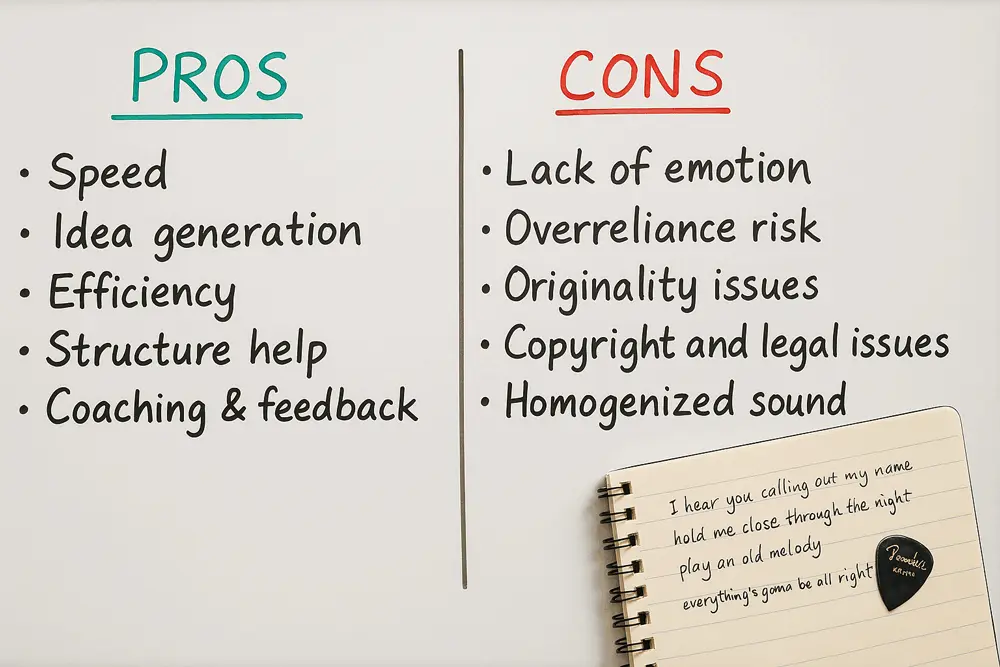AI has become a hot topic in songwriting circles, offering tools that can generate lyrics, melodies, and chord progressions in seconds. But just like any creative shortcut, they come with both advantages and drawbacks.
by CountryDemoStudio Staff | August, 11, 2025.

Whether you're a hobbyist or a seasoned pro, the temptation to lean on these AI music tools is strong. Understanding these can help you decide how to utilize generative AI without compromising your unique artistic voice.
Writer's block can be frustrating, and AI can help break through it by suggesting song titles, fresh lyrical phrases, chord changes, or melodic contours. Even if the AI output isn't perfect, it can spark ideas you might not have thought of on your own.
AI tools can generate pages of lyrics or multiple melody options in seconds. This speed can be helpful in brainstorming or quickly testing different creative directions before committing to one.
Many AI songwriting platforms allow you to analyze popular songs' structure, rhyme schemes, and chord progressions. Studying these patterns can improve your understanding of what makes particular songs resonate.
For those just starting out, AI can offer a gentle entry point into songwriting. It's like having a brainstorming partner who never runs out of ideas. Likewise, AI can help you learn song forms, rhyming patterns, melodic intervals, and other musical concepts. It's like having your own music tutor.
For all their convenience, generative AI music tools do come with some significant creative and legal drawbacks.
While AI can mimic patterns and structures, it can't feel. Its output often lacks the emotional nuance and lived experience that give songs lasting impact. AI frequently draws its inspiration from popular hit songs, producing lyrics or lyrical and melodic styles that have now become clichéd.
Using AI too heavily can lead to creative stagnation, where you become dependent on a tool instead of developing your own skills and voice. You may begin to question or lose confidence in your own ideas, always relying on AI for feedback. Such dependency runs the risk of developing a form of creative paralysis.
In many cases, songs generated entirely by AI are not eligible for copyright protection in the U.S., and publishers or licensing companies may refuse to accept them. As of this writing, most of them won't.
💡 Important reading: How to Document Your Song's Creation for Extra Proof of Authorship
Why Music Publishers and Licensing Companies Won't Accept Your AI Song (And What to Do About It)
If everyone uses the same AI tools, songs risk sounding alike—making it harder for your work to stand out. One of the most apparent characteristics of AI mixes is that they lack dynamics and the peaks and valleys you find in human-played and produced music.
AI can be a great supplement to your songwriting process, but it should never replace your creativity. Use it to inspire, not to define. Start with your own ideas, then let AI help fill gaps or explore variations.
👉 If you've already written with AI and want to make your song truly stand out—and eligible for publishing—our AI-to-Human Song Service can help. We replace AI-generated tracks or vocals with those of professional musicians and singers, adding the emotional depth, polish, and authenticity your song needs.
Find the song demo style that fits your budget and your goals.
See Services